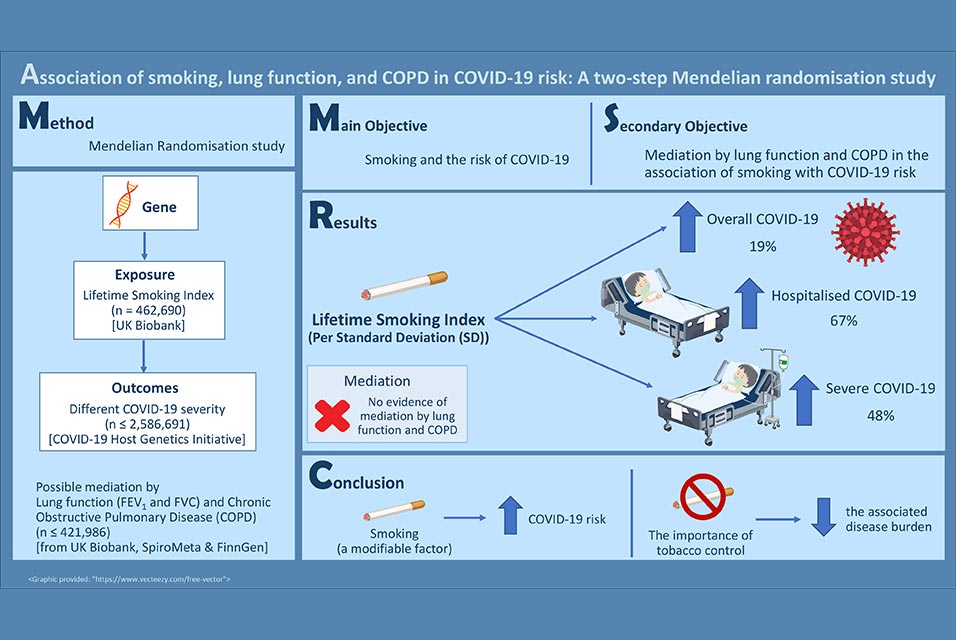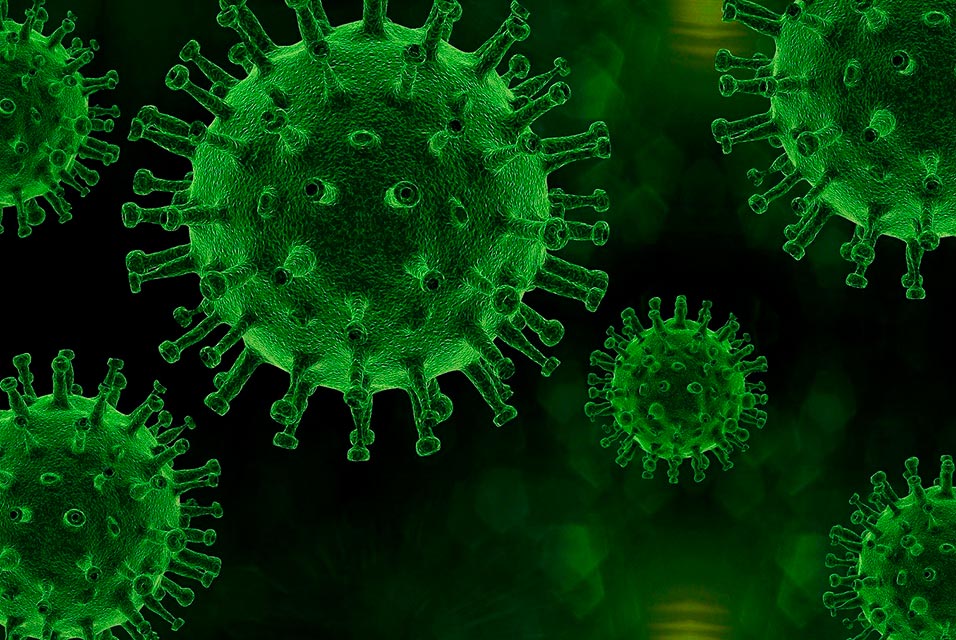HONG KONG.- Researchers from the School of Public Health,
LKS Faculty of Medicine of The University of Hong Kong, in collaboration with The Chinese University of Hong Kong’s (CUHK) Faculty of Medicine (CU Medicine), discovered a causal link between smoking and a higher risk of contracting mild to severe COVID-19, using data from large scale genome-wide association studies. The findings have been published in Addiction, a leading peer-reviewed substance use journal.
Background
Previous observational studies showed mixed results concerning smoking and COVID-19 risk, possibly driven by confounding factors arising from lifestyle, such as obesity, or biases by design which are difficult to account for in observational studies. Although more recent studies, including genetic studies have indicated a possible link between smoking and severe COVID-19 risk, the association between smoking and milder forms of COVID-19, which account for the majority of COVID-19 cases, remains unclear. Understanding the role of smoking in COVID-19 risk is particularly important given smoking cessation services are readily available in Hong Kong and could play a role in reducing COVID-19 cases in the community.
In this connection, the research team set out to explore the role of smoking in various severities of COVID-19 risk using a method called Mendelian randomisation. As genetic variants are used, this approach may circumvent some of the limitations present in conventional observational epidemiologic studies. The secondary objective is to explore the role of lung function and chronic obstructive pulmonary disease (COPD), known detrimental effects of smoking, in explaining the association of smoking with COVID-19 risk.
Research methods and findings
Using Mendelian randomisation, researchers extracted genetic variants related to smoking, proxied by the lifetime smoking index which captures smoking behaviour such as heaviness, duration and initiation, from a previous genetic study (N=462,690), and assessed their relation with COVID-19 risk from large genetic summary data of genome-wide association studies (N<=2,586,691).
The research team found that an increase in the lifetime smoking index (per standard deviation), which implies a heavier smoking behaviour throughout the lifetime, is likely to increase the risk of contracting (both mild and severe forms) COVID-19 by 19%, as well as to increase the risk of severe COVID-19 by 48%. However, lung function and COPD did not appear to mediate these associations. ‘Using a less biased design, our study highlights the role of smoking in increasing the risk of contracting COVID-19, including the milder forms, and clarifies confusion based on previous epidemiologic studies. These further substantiate the importance of smoking cessation in reducing the risk of contracting COVID-19, alongside the known fact that smoking is a major cause of poor health and reduces lifespan,’ said Dr Ryan Au Yeung Shiu-lun, Assistant Professor, Division of Epidemiology and Biostatistics of the School of Public Health, HKUMed.
Research significance
This is one of the first and largest studies to explore the role of smoking in different severities of COVID-19 using Mendelian randomisation, and it also implies smoking cessation services could be considered to reduce the risk of spreading COVID-19 in the community. ‘From a public health perspective, highlighting COVID-19 as another harm associated with smoking behaviour could be explored to further enhance the uptake of smoking cessation services amongst smokers, or reduce the initiation of smoking amongst non-smokers. These would not only curb the number of COVID-19 cases in the community but also improve overall population health given that smoking is a major cause of several diseases, such as cardiovascular disease and cancer,’ added Dr Au-Yeung.
‘Although the databases used for this study are predominantly related to European populations, it is unlikely that the detrimental effect of smoking in COVID-19 risk differs in other ethnic populations. Nevertheless, replication of these findings using genetic databases in non-European populations would be valuable to provide context specific evidence to support public health policies. Smokers are at a higher risk of contracting COVID-19 and more likely to have severe symptoms, which is why it is imperative for them to receive COVID-19 vaccination as soon as possible,’ said Professor Kwok Kin-on, Assistant Professor, The Jockey Club School of Public Health and Primary Care, CU Medicine.
About the research team
The research was conducted by a team co-led by Dr Ryan Au Yeung Shiu-lun, Assistant Professor, Division of Epidemiology and Biostatistics, School of Public Health, HKUMed; and Professor Kwok Kin-on, Assistant Professor, The Jockey Club School of Public Health and Primary Care, CU Medicine. Other members of the research team from the School of Public Health of HKUMed include Dr Mary Schooling, Associate Professor and Cluster Leader (Non-communicable Diseases in Global Health), and Dr He Baoting, Post-doctoral Fellow. The Investigator from CU Medicine is Professor Albert Martin Li.
Acknowledgements
This study was supported by the Pre-emptive retention/Start up fund, LKS Faculty of Medicine, The University of Hong Kong (Dr Ryan Au Yeung Shiu-lun). Professor Kwok Kin-on acknowledges support from Health and Medical Research Fund of the Food and Health Bureau (Reference nos. INF-CUHK-1, 17160302, 18170312) , The Government of the Hong Kong Special Administrative Region (HKSAR); Hong Kong Research Grants Council - General Research Fund (reference nos. 14112818, 24104920); Wellcome Trust Fund (United Kingdom, 200861/Z/16/Z), and Group Research Scheme of The Chinese University of Hong Kong.










